On February 22, 2020 Al-Khaleej Online, a Qatar-affiliated news website based in the U.K., reported that an Iran-backed media has been operating covertly in Iraq for years, working to promote an anti-U.S. agenda " as part of a "psychological warfare operation that also targets other International Coalition state members such as France Canada, Australia, UAE and Saudi Arabia.
The report claimed that the ring is ran by Iran's Islamic Revolutionary Guard Corps (IRGC) has also been working to clean up the image of Iran and Iran-backed Shi'ite militias and politicians in Iraq while also discrediting independent journalists and activists who oppose Iran's intervention in Iraq.[1]
The report included details on the scale of the media ring, and listed the names of its senior members, locations of their four Baghdad-based offices, and its sources of funding, all based on documents "leaked by the Investigation Department of the Iraqi Intelligence Service."
The report said that the ring employs 175 media operatives who receive monthly salaries ranging between $600-$2000, who run social media accounts that disseminate pro-Iran messages. The report also claimed that the ring has more than 300 affiliates working across government departments and media outlets.
According to the report, the documents included a confession from Iraqi journalist Samir Obied Al-Ogaily in which he admitted to being a major operative in the ring. Al-Ogaily was arrested by Iraqi authorities in 2017, after Haider Al-Abadi, Iraq's Prime Minister at the time, filed suit against him, accusing him of spreading false information that was damaging Iraq's national security.
The report noted that prior to his work with the Iraqi government, Al-Ogaily worked as liaison between Syrian intelligence and Al-Qaeda in Iraq, where he helped the latter set up media branches for the group inside Syria. He also raised funds for the so-called "Iraqi resistance groups" through a website he named "The Third Force."
The resurfacing of the Al-Khaleej Online report coincided with the appearance of images shared by Iraqi users across social media, which show a private Twitter message sent by the slain Iraqi researcher and analyst Husham Al-Hashimi, addressed to an unidentified recipient. The message included a list of the names of people Al-Hashimi described as IRGC media operatives in Iraq.
Notably, in recent weeks a wave of pro-Iran street gangs has been threatening to silence anyone they perceive to oppose their ideology. Among these gangs of teens and young men are Jabhat Abu Jeddahah (The Cigarette Lighter Front,) Al-Zelm Al-Khashnah (The Tough Guys), Fariq Fatemiyoun Al-Maydani (Fatemiyoun Field Group), and Jond Soleimani (Soleimani's Soldiers.)[2] Also, a number of Iraqi journalists have recently resigned and gone into hiding amid a campaign of threats.[3]

The Al-Khaleej Online report (source: Alkhaleejonline.net, February 23, 2020.)
The following are the main claims made in the Al-Khaleej Online article:
Who Is Samir Al-Ogaily?
Samir Obied Al-Ogaily worked with Syrian Intelligence Air Force Branch 235, coordinating between them and members of Al-Qaeda in Iraq, and helping them establish media offices and camps in Latakia and Abu Kamal, Syria. He also helped raise funds for the so-called "Iraqi Resistance" to U.S. forces between 2004 and 2009, through a website called The Third Force.
In 2009, Syrian Intelligence found that Al-Ogaily had sold information to the intelligence agency of a pro-U.S. country, and he was dismissed. He was then recruited by Yassin Majeed[4] to work as media advisor at the "consulting department" of the Iraqi Ministry of the Interior, which was then run by Abu Mustafa Al-Shaybani, who the report claimed worked as liaison officer between the Ministry and the IRGC.
In 2014, Iraq's then-Prime Minister, Haider Al-Abadi, fired Al-Ogaily on the grounds that he lacked academic qualifications and was frequently absent from work.
Following his dismissal, Al-Ogaily launched a smear campaign against Al-Abadi, forcing the latter to file a lawsuit in 2017 on charges of fabricating information to harm the state's reputation and national security. The lawsuit came after Al-Ogaily made an appearance on a local Shi'ite TV channel and claimed that during a visit to Saudi Arabia, Al-Abadi boarded a private plane alongside his Chief of Intelligence at the time, Mustafa Al-Kadhimi, and travelled from Jeddah to Tel Aviv. Following the interview, Al-Ogaily was arrested for six months, said the report.
Senior Members Of The Media Ring And Its Financing
The article claimed that Al-Ogaily confessed in a judicial affidavit that the media advisor at the Iranian Embassy in Baghdad, Agha Shaheeni Irani, oversees the media ring's local operations, and assisted by journalist Qassem Qassir, who is affiliated with the Lebanese Hezbollah.
Among the ring's senior members, the report alleged, is cleric Hameed Al-Husseini, who chairs the Iraqi Islamic Union for Radio and Television, which receives a yearly donation of five million USD from former Iraqi Prime Minister Nuri Al-Maliki, who is also Iran's top ally.
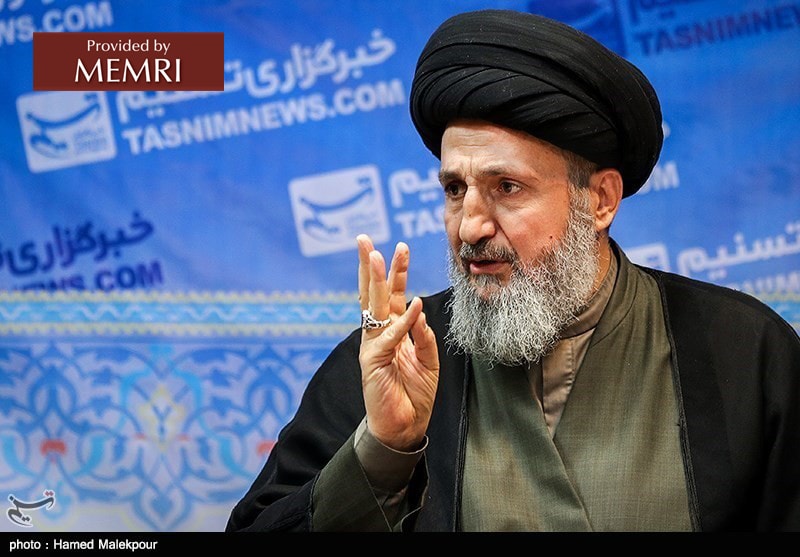
Hameed Al-Husseini (Source: Shafaqna.com, February 27, 2020)
SUPPORT OUR WORK

The ring, said the report, has 309 employees and sponsors the budget of 17 Shi'ite satellite channels, three radio stations, five newspapers, two weekly magazines, and six research centers.
Among the ring's senior editors, who determine the group's editorial guidelines, are several journalists, claimed the report. These include London-based journalist Najah Muhammad Ali, director of the iNews satellite TV channel, Abdul Al-Amir Al-Aboudi, and Baghdad-based columnist and reporter Mazen Al-Zaidy.
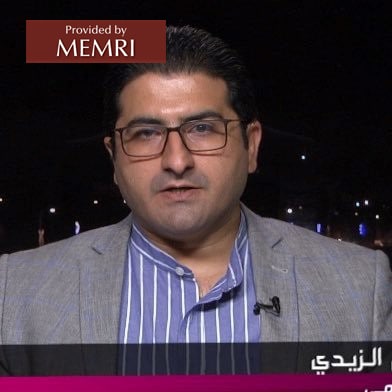
Mazin Al-Zaidy (Source Twitter.com, October 23, 2020)
The article listed additional members of the ring, such as journalist Ahmed Abdul Al-Sada, who works for the Iraqi state-run newspaper Al-Sabah. The report noted that he is known for his "hostile criticism of Iraqi Sunnis and Kurd officials, as well as of Emirati and Saudi authorities." The report also claimed that Al-Sada "is a former informant for the Iranian intelligence."
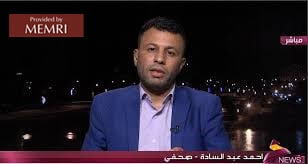
Ahmad Abdul Sada (Source: Facebook.com, June 16, 2020)
The ring also relies on Ali Al-Mutairi, according to the report, saying he "specializes in spreading rumors, using his position as manager of the Kata'ib Hezbollah television channel Al-Itijah."
Other alleged operatives for the ring listed by the report included: PMU media director Muhannad Al-Oqabi; poet Hussein Al-Kased; Secretary General of the Iraqi Red Crescent Organization and Hezbollah satellite TV channel presenter Muhammad Al-Khuzai; Syria-based novelist Ahmed Hataf.
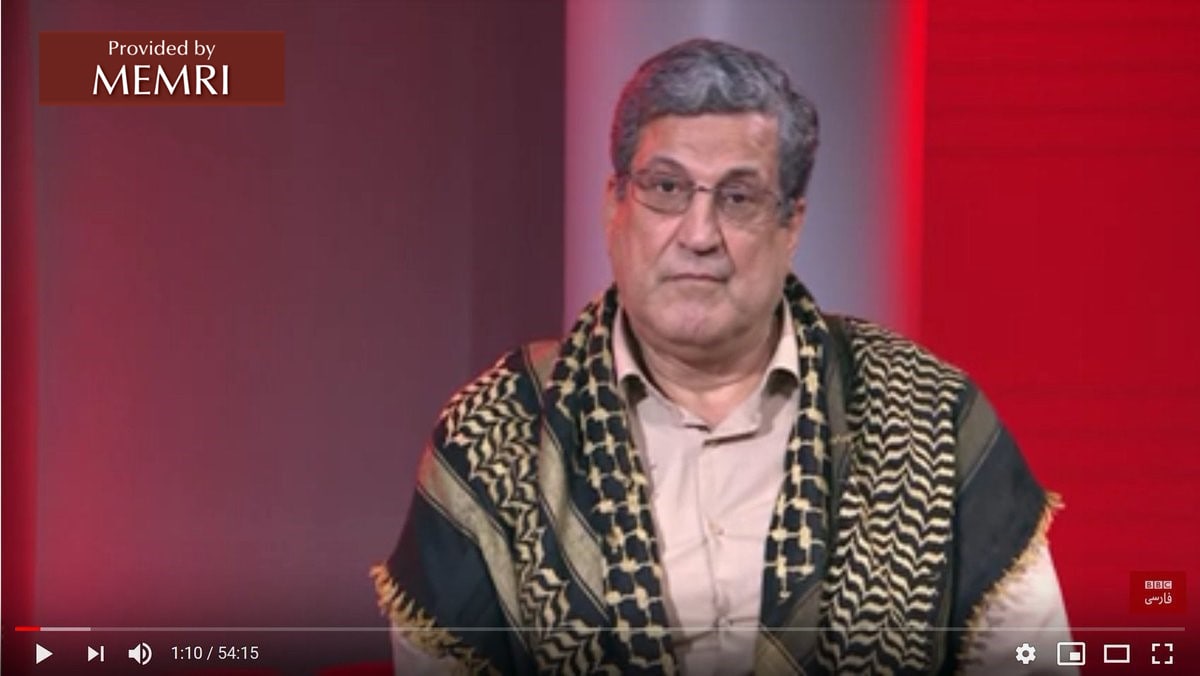
London-based journalist Najah Muhammad Ali (Source: Twittr.com, October 23, 2020)
The report stated that the ring's social media accounts are supervised by Ali Mared Al-Asadi, a Facebook blogger who is widely known of his sectarian and provocative content. The report noted that the ring maintains a network of 175 media operatives in total, comprised of both men and women. Their salaries range between $600-$2000, said the report, and are paid mostly from the PMU's budget, which is allocated by the Iraqi government.
The report added that ring's administrators mandate that its operatives create separate accounts on Facebook, one using their real name, another under a pseudonym, where they are required to regularly publish content that supports Iran's agenda,
The ring allegedly also recruited 66 government employees who work at the Iraqi General Secretariat of the Council of Ministers, who spy on officials and leak classified documents. The report claimed that these employees are handled by MP Yasser Sakhail Al-Maliki, the son-in-law of former Iraqi Prime Minister Nouri Al-Maliki.
Operations And Objectives
According to Al-Ogaily's confessions, said the report, the ring's media operatives use their public platforms to disseminate information they describe as 'leaked,' but which in fact is often fabricated, and is intended to discredit certain people by accusing them of being spies for the U.S. Embassy in Baghdad, or of being involved in 'outreach programs' allegedly run by the embassy.
The report explained that one of the media ring's key objectives is "to clean up the image of Iran and its proxies in Iraq" as part of a "psychological warfare operation." The report added that this task has proven to be one of the ring's most challenging objectives so far.
In addition, said the report, the media ring's operatives publish content that is hostile to the UAE, Saudi Arabia, and the Baghdad embassies of the U.S., U.K., Canada, Australia, and France.
As part of this objective, the report claimed, the ring is trying to present Shi'ite figures as national heroes, and the PMU as a counterpart of the Iraqi Counter-Terrorism Force. In addition, the report continued, the ring approaches secular parties and organizations and introduces the Shi'ite Islamists as "New Shi'ite Resistance" factions.
Alongside these tactics, the ring is heavily involved in "recruiting educated and secular media professionals to work within its circles, and silences non-Shi'ite media outlets in order to control the [media] landscape".
The Media Ring's Offices
The ring has four offices in Baghdad, said the report. The first is allegedly located in the Al-Arasat district, inside the headquarters of Kata'ib Hezbollah's satellite TV channel Al-Atjah.
A second office is allegedly run by columnist Mazen Al-Zaydi from an apartment located near the Iranian Embassy in the Al-Salehyia district.
A third office is alleged to be located in the Al-Karrada district, inside the headquarters of the iNews satellite TV channel, which is affiliated with the Iran-backed group Sayyid Al-Shuhada' Brigades.
A fourth office, said the report, is in the Al-Karrada district of Baghdad, near Redha Aloun, a café that is popular among Iraq's cultural elite.
Al-Hashimi's List Of Iran's Media Operatives
The resurfacing of the Al-Khaleej Online report coincided with the appearance of images shared by Iraqi users across social media showing a private message sent by the slain Iraqi researcher and analyst Husham Al-Hashimi, who was killed by unidentified gunmen in July, and another person, whose details are blurred out in the circulated image.[5]
The images show a message dated May 31, 2020 in which Al-Hashimi appears to have sent a list of the names of people which he described as media operatives affiliated with the IRGC's media ring.[6]
The list includes 14 names, most of which were also mentioned in the Al-Khaleej Online report. He also mentioned three locations for the ring offices in Baghdad, all of them were included in Al-Khaleej Online report.
In his message, Al-Hashimi asked the person he was messaging not to disclose his identity, as he fears his life may be in danger, "because the people listed [here] do not have any fear of Allah or of the law."[7]
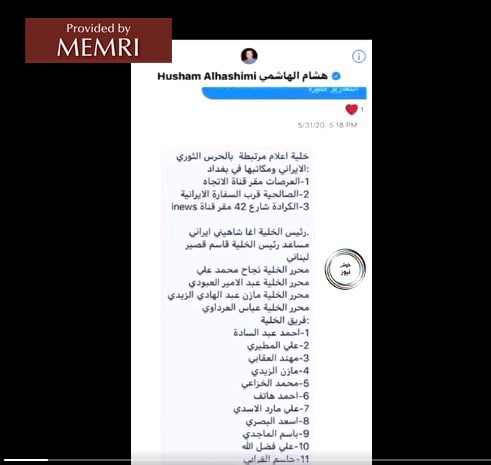
The message attributed to Al-Hashimi, which included a list of 14 media operatives (source: Alhurra.com, October 22, 2020.)
[1] Alkhaleejonline.net, February 23, 2020.
[2] See MEMRI JTTM report, New Shi'ite Group In Iraq Claims Responsibility For Recent Arson Attacks On Local Media Outlets and Political Parties, October 19, 2020.
[3] See MEMRI JTTM report, Iraqi Reporters Resign, Go Into Hiding After Receiving Death Threats From Iran-Backed Militias, September 16, 2020.
[4] Then the Press Secretary of Former Iraqi Prime Minister Nuri Al-Maliki
[5] See MEMRI Inquiry & Analysis Series No. 1523, Iraq On The Path Of National Recovery From Iranian Hegemony – Part VII: Husham Al-Hashimi – Chronicles Of A Murder Foretold, July 10, 2020.
[6] See MEMRI Inquiry & Analysis No. 1523, Iraq On The Path Of National Recovery From Iranian Hegemony – Part VII: Husham Al-Hashimi – Chronicles Of A Murder Foretold, July 10, 2020.
[7] Khosh_news2020 October 21, 2020.




